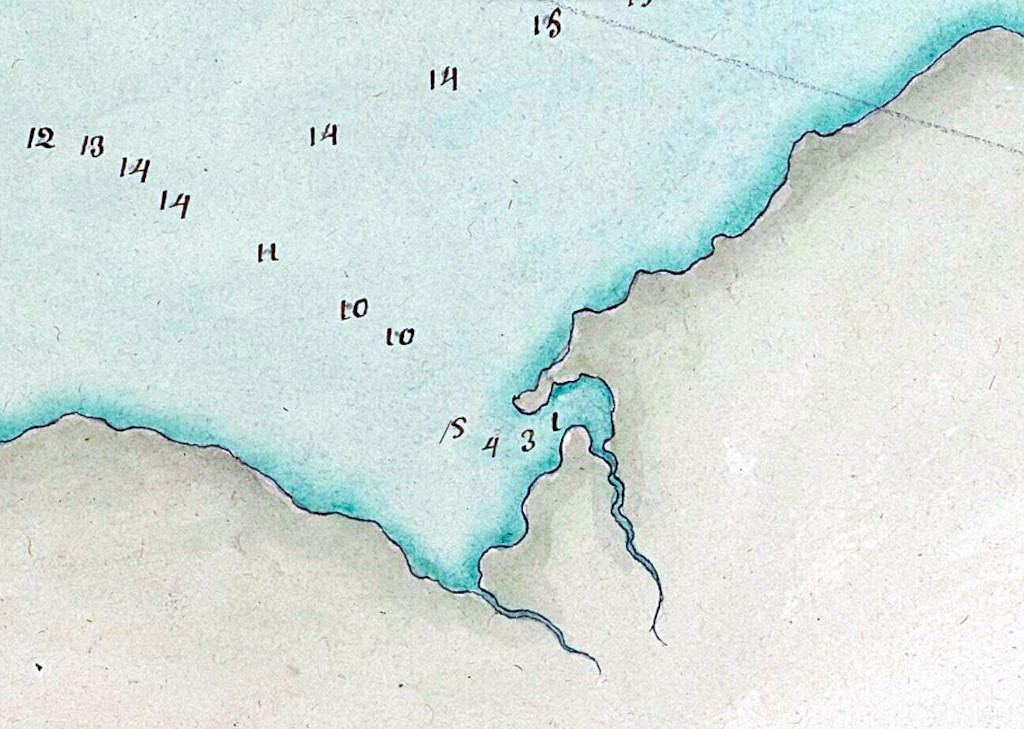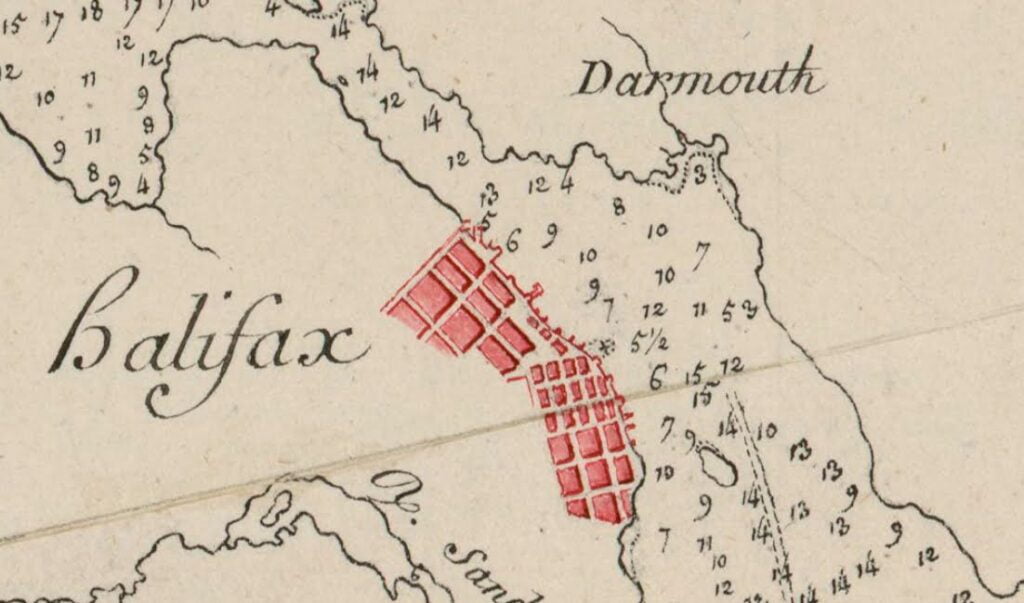
“Plan du port de Chibouctou” >1750. https://gallica.bnf.fr/ark:/12148/btv1b53089629x
Amicitia Crescimus

“Plan du port de Chibouctou” >1750. https://gallica.bnf.fr/ark:/12148/btv1b53089629x
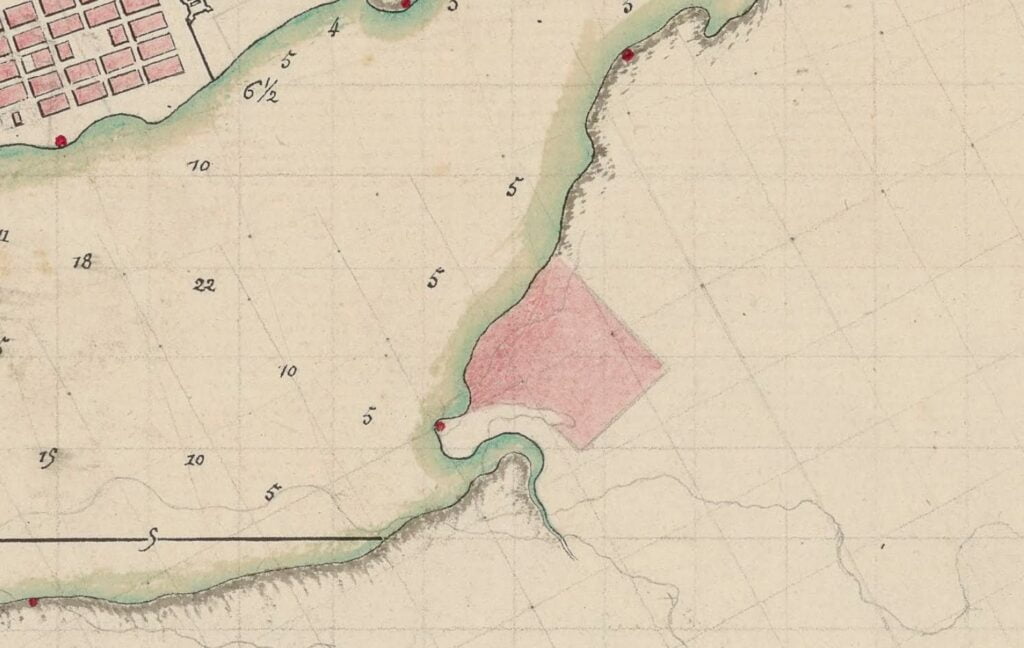
Chabert, Joseph-Bernard de. “Plan de la rade et des ports de Chibouctou” >1750. https://gallica.bnf.fr/ark:/12148/btv1b530900341/f1.item.r=chebouctou.zoom
In these papers we see Mr. Popple acknowledging concerns about settling Nova Scotia, promising imminent updates. Another letter stresses the urgency of establishing settlements on Nova Scotia’s coast and building forts for protection, citing the importance of the fishery. The Council of Trade proposes methods to encourage settlement, highlighting Nova Scotia’s natural resources and the need for military defenses against French inhabitants.
Also notable, a mention of “Shebuctoo”, what appears to be an alternative spelling of Chebucto, now Halifax Harbor — “And as nothing can so effectually restrain the disobedience of the French inhabitants remaining in Nova Scotia, who refuse to take the oaths of allegiance to H.M., as the building of two stockadoed barracks, in or near their quarters at Minos and Shebuctoo, we beg leave to recommend this also to your Lordsps. consideration, because we are informed the charge of those baracks will not be considerable.”
Mr. Popple to Lt. Governor Armstrong. Acknow ledges letters of 27th July and 24th Dec. 1726. Continues: — My Lords Commissioners having at present under their consideration the immediate settlement of the Province of Nova Scotia, you may expect shortly to hear from them upon this subject. [C.O. 218, 2. p. 56.]
Ar. Gambell to the Council of Trade and Plantations. Some reasons and proposuals for settleing the main coast of Nova Scotia, with all imaginable speed etc. Urges importance of the Fishery, and the immediate building of forts at the three most commodious harbours,—Port Rossway, Cape Sambra and Owles Head, to be settled by disbanded soldiers, which will serve to protect the Fishery etc., and this valuable neglected country, to which not one subject has ever thought fitt to transport themselves, nor has any publick incouragemt. been given since in the power of great Brittain etc. Offers services. Endorsed, Recd, (from Col. Bladen), Read 1st June, 1727. 3 ¾ pp. [C.O. 217, 4. ff. 344–345v;.]
Council of Trade and Plantations to the Committee of the Privy Council. Representation in obedience to Order of 15th Feb. concerning the settlement and government of Nova Scotia :—We shall not repeat what has been so fully set forth in several of our former reports, relating to the present state, the situation and consequence of Nova Scotia, but as the methods which we shall propose to your Lordsps. for peopling of this country may appear something differt. from those generally practised in the rest of H.M. Colonies, we shall be under a necessity of mentioning some particular facts and observations which have led us into the way of thinking we are now in upon this subject, and which we hope may be inducements to your Lordsps. to be of the same opinion with us. This country is capable of yielding all the necessaries and conveniencies of life, the soil is proper for the production of hemp and other Naval Stores the land abounds with timber of several kinds ; and the sea coast, especially at Canso, with as good fish and in greater quantities, than are to be found in any other part of the American seas.
Yet notwithstanding these natural advantages Nova Scotia instead of being useful, has hitherto been a burthen to Great Britain for want of inhabitants, and the Regiment which has been so many years maintained there at the expence of ye publick has only been able to. keep up H.M. claim to the soil, whilst the French have reaped solid advantages from the produce of this Country: For the French inhabitants who refuse to take the oaths of allegiance to H.M., and still remain in Nova Scotia, contrary to the Treaty of Utrecht have been the great support of all the French Colonies in their neighbourhood, by supplying them with furs, fish, cattle, corn, provisions, and timber of all kinds, and without this assistance in all probability neither Cape Breton nor Isle Madam could in so short a time have established themselves upon so good a footing. Nova Scotia has now been many years in possession of the British Crown, yet there are hitherto few or no British inhabitants there, except the Garrisons of Annapolis and Canco, and some few English families who have settled at the latter of these places for the benefit of the Fishery, which has of late years been carried on there with very great success.
The little progress therefore which we have hitherto been able to make in peopling so fertile a country, whilst the French have so considerably increased their settlement at Cape Breton, in a very barren soil, is a proof that the Government of France have given greater incouragements to their subjects to settle in their Colonies, than has been given for the like purpose by the Government of Great Britain to theirs, and we have been credibly informed, that the French King is at a great expence in encouraging and nursing up his infant Colonies till they are able to support themselves, such as defraying the expence of transportation furnishing ye Adventurers with one years provisions and building strong fortifications for their defence.
Since H.M. accession to the Crown some persons have petition’d for large tracts of land in Nova Scotia, and they have been referred to this board who always thought it their duty upon those occasions to propose such conditions and restrictions as well with respect to quitrents, as to the manner of seating and settling the lands petition’d for they then conceived the most convenient for H.M. service, and most effectual for the peopling of this Province but whether the Petitioners thought the conditions too hard, or whether they have been discouraged by the delays and difficulties they have met with in passing thro’ ye other Offices, or from some other accident, so it has happen’d, that none of these projects have hitherto taken effect, but since lands are to be had upon such easy terms in so many other of H.M. Colonies allready well inhabited and in a reasonable state of security, greater encouragements will be necessary to induce people to settle in Nova Scotia, the most Northern part of the British Dominions upon the Continent of America, a country without defence exposed to the fury of the [Mi’kmaq] and to the encroachments of ye French.
For this reason and from the experience of so many years, we beg leave to say, the publick must be at some expence to make any schemes for this purpose effectual, and that the terms must be more advantageous to the adventurers, than those that are to be met with in Colonies already settled. However as we are sensible how difficult it might be to engage the publick in any new expence we shall propose a fund for this purpose arising from the Plantations, and naturally applicable to their service, that is to say, the produce of the French lands at St. Christophers, or at least so much of it, as may from time to time be thought necessary for this purpose, wherein the Parliament have already made a precedent by addressing H.M. to make some provision out of this fund, for the new Colledge proposed to be erected in the Bermuda Islands. Thus having explained in genl. our thoughts upon the methods we intend to propose for the peopling of Nova Scotia, we shall now proceed to offer to your Ldsps. consideration such particulars as have occurrred to us upon this subject, without entring too minutely into the detail of them as to their execution, which may be the subject of a further report; if our sentiments meet with your Ldsps. approbation.
The preserving of H.M. woods in this Province in our humble opinion should be provided for previous to the granting of lands, and therefore as we had found by long experience upon how bad a foot this matter stands in the Massachusets Bay ; New Hampshire and other Provinces on the Continent of America, where the woods reserved to H.M. are frequently intermix’d with private property and are for that reason the constant subject of debate between the King and his subjects, we thought it for H.M. service in forming the Instructions for Col. Philips to provide etc. Quote his Instructions as to reserving 200,000 acres for masts for the Navy etc. Continue:— And we beg leave again to propose that the Surveyor General or such person as H.M. shall think proper to appoint for this purpose, may forthwith be directed to lay out these woods, that the Govr. may afterwards be at liberty to grant lands under proper restrictions.
The delay of this matter has already been highly prejudicial to H.M. intrest, for the French inhabits, in this Province having erected saw mills, are daily destroying the timber, and the want of a power in the Governor to grant lands would have made it impracticable for planters to settle there even upon any terms had there been no other impediments to the setling of this Province. To encourage Adventurers from Great Britain to engage in the making of large settlements in this country we are humbly of opinion that such petitrs. whose cases have already passed the consideration of this Board, and whose petitns. lye now before H.M. in Council, for the last decission should meet with all reasonable dispatch more particularly that of the Officers, who were actually engaged in the reduction of Nova Scotia and whose services seem justly to entitule them to H.M. favour, and so much the rather because by the conditions of their grant, if they obtain one, they will be obliged within a few years to make a considerable settlement on the lands they petitioned for.
We have already hinted that few people will care to settle in a savage country where there is not a reasonable security against the natives, and this kind of encouragemt. is wanting in the highest degree in Nova Scotia; There was formerly one Fort at Annapolis Royal, but we are inform’d the bastions and curtains, the barracks and the storehouses, are at present in a most ruinous condition in so much that the Garrison have been obliged to secure themselves from surprize, by setting up pallisadoes about the said Fort for want of a better defence ; We presume therefore your Ldsps. will be of opinion, that this Fort, the barracks and storehouses belonging to it should be immediately repaired. The fishing at Canço likewise will deserve your Ldsps. protection ’tis at present the best in America, and a fort there, will be highly necessary for many reasons, but more especially on account of its neighbourhood to Cape Breton.
And as nothing can so effectually restrain the disobedience of the French inhabitants remaining in Nova Scotia, who refuse to take the oaths of allegiance to H.M., as the building of two stockadoed barracks, in or near their quarters at Minos and Shebuctoo, we beg leave to recommend this also to your Lordsps. consideration, because we are informed the charge of those baracks will not be considerable. We shall not at present propose any further expence to your Lordships, upon the head of fortifications tho others may hereafter be needful on different parts of the coast. But we conceive it highly necessary for H.M. service that there should always be a sufficient magazine of arms and working tools lodged in some secure place in this Province for the service of the country. If your Lordps. should agree with us in these particulars, they will certainly be some encouragement for people to resort to Nova Scotia but further inducements will still be wanting, and therefore we would humbly propose. That the publick should be at the expence of transporting such poor people to Nova Scotia as are disposed to settle there together with their wives and families. That 50 acres of land should be granted to each person so transported by the Governor upon his or her arrival in Nova Scotia, free from fines and likewise from quit rents for the first ten years.
That double that quantity of land be granted to Carpenters, Smiths, Masons, Joyners, Brickmakers, Bricklayers and all other artificers necessary for building or husbandry upon the same terms. That the like quantity of land be granted to such soldiers of Col. Philips’s Regiment and their families as are disposed to turn planters and their pay notwithstanding to be continued to them for one year after such grant at which time they may be discharged from the service. That all the recruits to be raised for the future for this Regiment be acquainted that after three years service they may be discharged and have lands granted to them in like manner. And the better to people this country, that every soldier have leave to carry his wife with him, the transport both of the soldier and his wife to be defray’d by H.M., it being impossible for the Regiment otherwise to bear these frequent discharges. That proper encouragement be given to such as shall intermarry with [Mi’kmaq], agreeable to the tenour of H.M. Instructions to Col. Philips. That whereas the Governor is at present restrained from granting any more than 500 acres to any one person he may now be empower’d to grant lands not exceeding 1,000 acres free from fines and likewise free from quit-rents for tenn years under proper restrictions, to such substantial inhabitants, and their families as shall be disposed to settle in Nova Scotia at their own expence.
And that every part of this country may be informed what is transacting in other quarters of the Colony, that ye small sloop formerly built at ye King’s expence, and now remaining in Nova Scotia, may be refitted and employ’d to attend the service of this Government. It now remains that we shou’d offer our thoughts to your Lordships concerning the form of a Civil Governt. to be erected in this Province, which in our humble opinion is already in some measure provided for by Col. Philips’ Commission and Instructions so far as the present circumstances of this country require, or can admit of till there shall be more inhabitants there, but in the mean time if your Losps. shall think it convenient the Govr. and Council may be impower’d to make such laws or regulations as the emergencys of the Colony may demand till there shall be sufficient numbers to constitute an Assembly: That the Governor may likewise be authorized to make Justices of the Peace and directed to declare in H.M. name by Proclamation or otherwise, that such persons as shall settle in Nova Scotia shall be entituled to all the like privileges, liberties and advantages which are at present enjoy’d by the rest of H.M. subjects in His other American Colonies, and particularly to that of an Assembly so soon as their circumstances will admit of it.
We shall beg leave to conclude this Representation with informing your Lordsps. that what we have proposed upon this occasion is not without a president in many particulars, as to the expence even in one of H.M. own Colonies namely, that of Jamaica, where the inhabitants are so far convinced how much it is their intrest to have their Island well peopled that by certain Acts lately passed their Assembly to encourage people to settle the N.E. quarter of that Government have proposed, to purchase the lands in that quarter from the present Proprietors at 5s. p. acre, to be at the charge of transporting the Adventurers, to furnish them with six months provisions for their families after their arrival, to grant them lands to settle on in proportion to the number of their families free from taxes for three years without any fees to be paid either for the grant or survey with many other privileges and advantages. [C.O. 218, 2. pp. 57–71.]
H.M. Commission for Col. Richard Phillips to be Governor of Nova Scotia and the town and garrison of Annapolis Royal. Countersigned, Townshend. [C.O. 324, 36. p. 55.]
i. Circular Letter from the Council of Trade and Plantations to the Governors of Plantations. We do earnestly recommend to you, that you proceed without loss of time in the execution of above Order for proclaiming the King etc., in the most solemn manner and most proper parts of your Government.Upon this occasion we think it proper to acquaint you, that by an Act passed in the sixth year of Her late Majesty, for the security of H.M. person and Government etc., it is enacted that all publick seals in being, at the time of the demise of H.M., her heirs and successors, shall continue and be made use of as the respective seals of the Successor until such Successor shall give order to the contrary. N.B. This paragraph did not go to Nova Scotia, Newfoundland nor the Propriety Governments. And for your further information we inclose to you, H.M. Proclamation for continuing all Officers etc. [C.O. 324, 11. pp. 46–48.]
“America and West Indies: June 1727.” Calendar of State Papers Colonial, America and West Indies: Volume 35, 1726-1727. Eds. Cecil Headlam, and Arthur Percival Newton. London: His Majesty’s Stationery Office, 1936. 296-312. British History Online. Web. 2 April 2020. http://www.british-history.ac.uk/cal-state-papers/colonial/america-west-indies/vol35/pp296-312.
From The Story of Dartmouth, by John P. Martin:
Dartmouth, long before the European explorers and colonizing forces, had a 7,000 year history of occupation by the [Mi’kmaq]. The [Mi’kmaq] annual cycle of seasonal movement; living in dispersed interior camps during the winter, and larger coastal communities during the summer; meant there were no permanent communities in the Euro-centric sense, but Dartmouth was clearly a place frequented by [Mi’kmaq] for a very long time. Whether it was the Springtime smelt spawning in March; the harvesting of spawning herring, gathering eggs and hunting geese in April; the Summer months when the sea provided cod and shellfish, and coastal breezes that provided relief from irritants like blackflies and mosquitos, or during the autumn and its eel season; Dartmouth with its lakes and rivers, both breadbasket and transport route back and forth to the interior, was a natural place for the [Mi’kmaq] to spend their non-winter months.
A fascinating look into what Nova Scotia and Atlantic Canada could’ve looked like, from the end of the ice age at 19,000 BCE, until present. By 12,000 BCE, this model shows Cape Cod extending much further into the ocean than it does at present, along what is now Brown’s bank, a ridge which more or less stretches all the way to Sable Island along the continental shelf. A sea level 300 feet lower than it is today was enough to create a kind of land bridge to the parts of western and central Nova Scotia no longer under ice, the Bay of Fundy looking like it was an inshore repository for glacial meltwater until sea levels rose. This could’ve allowed for human exploration and settlement in what is now known as Nova Scotia previous to the retreat of the ice sheet in full.
By 10,000 BCE most of the ice had retreated, which squares with the earliest artifacts found in the area, such as at Debert, which date to the same general period, if not previous to that. That sea levels had risen one hundred feet in this two thousand year period might be instructive as to why artifacts are few and far between from this period, many of the settlements, if coastal, would have long ago been lost to the sea. Assuming the artifacts found (at Debert and Belmont) were not from nomadic hunters, and that this model is somewhat accurate, Nova Scotia could have been settled for 10,000 years or more.
Source: https://web.archive.org/web/20210807155606/https://sos.noaa.gov/catalog/datasets/blue-marble-sea-level-ice-and-vegetation-changes-19000bc-10000ad/, https://web.archive.org/web/20130219202242/https://sos.noaa.gov/Docs/bluemarble3000h.kmz
A census of the district of Acadia taken in 1687-1688 attributed to de Gargas shows Chebucto had 1 French family consisting of a man, wife and son; that there were 7 Mi’kmaw men, 7 Mi’kmaw women and 19 Mi’kmaw children, “36 souls” in total. 1 French house, 7 Mi’kmaw homes, 3 guns, 1/2 acre of improved land.
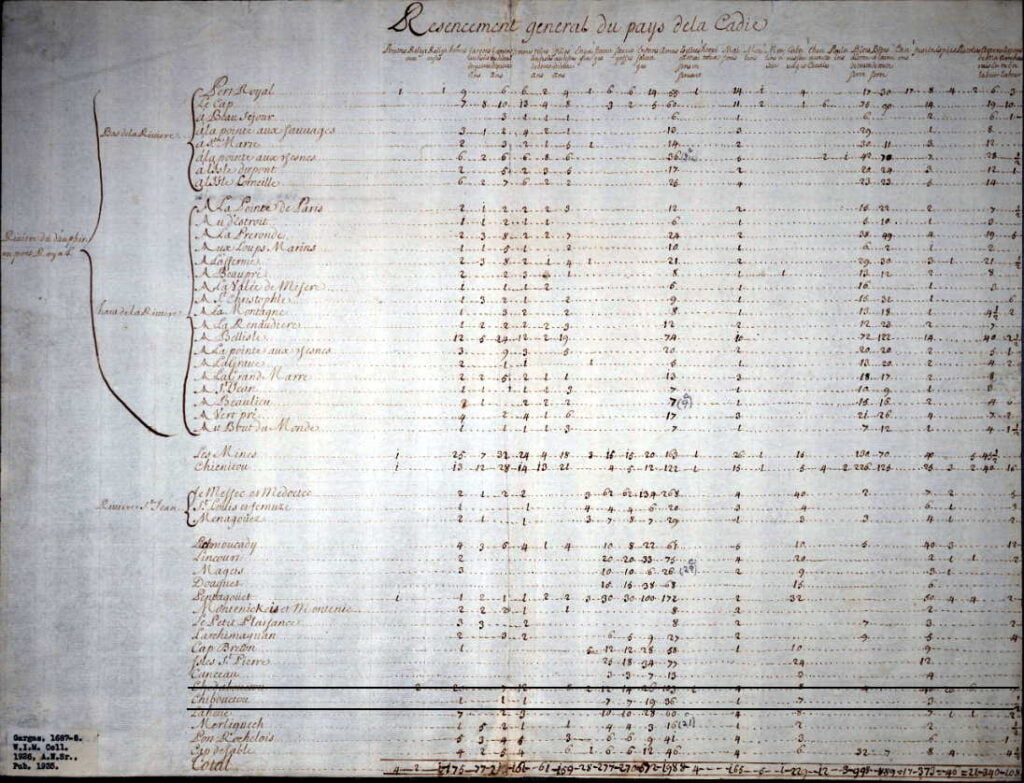
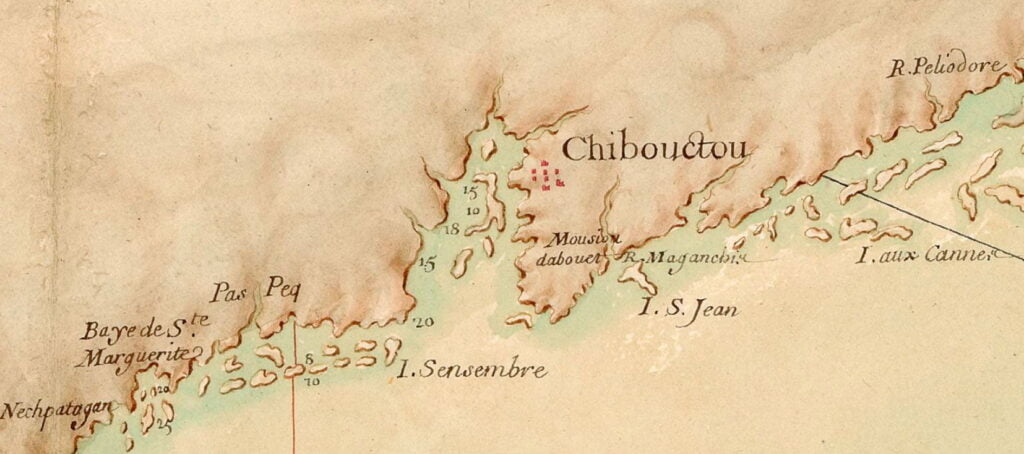
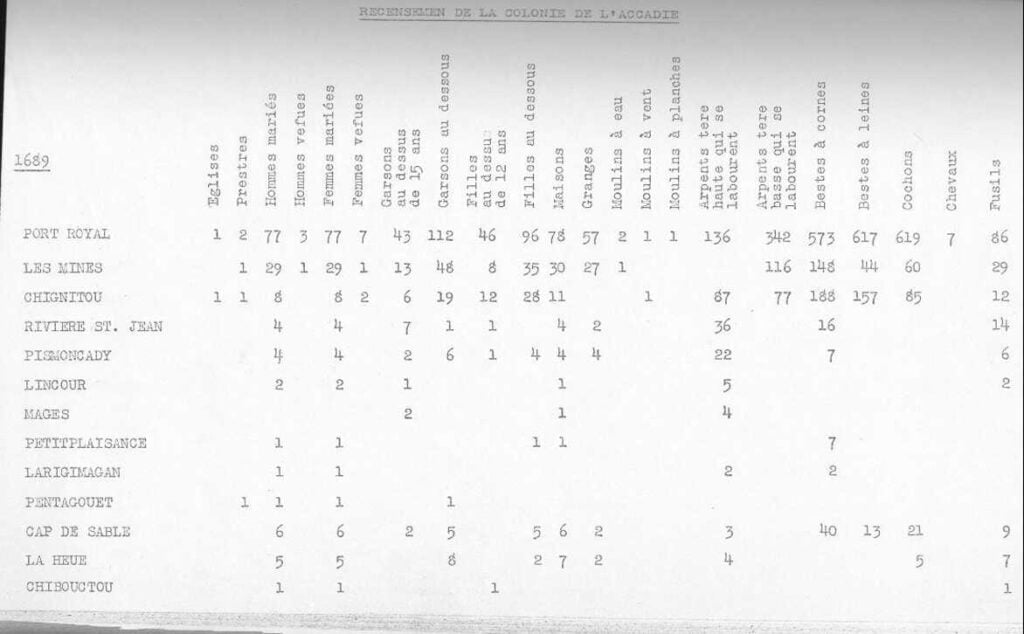
The St. Malo fishermen who were located at Sambro and at Prospect in the days of French ownership, must often have run to the inner harbor either to dry fish on our long beaches, or to barter furs with the natives who were always their allies. On the Dartmouth side of the harbor, geographical conditions were far more favorable for congregating, with three voluminous streams of never-failing fresh water flowing down to the estuaries of the two little bays, both later known as Mill Cove.
Besides that, there was an abundance of shell fish available at low tide, along with lobsters, crabs, sea-trout, salmon, halibut, codfish, and haddock, with the usual runs of herring and mackerel in warm weather. The woods teemed with wild life. Partridge roosted on trees, moose and deer roamed the forest, and wedges of wild fowl honked high overhead.
The evidence already submitted that the [Mi’kmaq] resorted to the Cove, is borne out by the description of Cobequid (Truro district) by Paul Mascarene about 1721, where he states that “there is communication by a river from Cobequid to Chebucto”. This Implies that the Shubenacadie route had long been in use. Engineer Cowie, after studying several harbor sites for Ocean Terminals a hundred years ago was of the opinion that Chebucto had been used as a trading post over a century before its permanent settlement.
In 1701, when M. Brouillan the newly appointed French Governor, came here from Newfoundland to rule Acadia, he went overland from Chebucto to Port Royal. This is in Murdoch’s History. Dr. Thomas H. Raddall, in his bicentennial story of Halifax, thinks that on this occasion, [Mi’kmaq] transported the Governor by the well-known canoe route of Dartmouth Lakes. (One can’t imagine a viceregal party trudging over a rough black-flied trail from Bedford to Windsor, or portaging through the shallow rivers of that section of country).
One of the early sketches of Dartmouth side is preserved at the N.S. Archives. It is a detailed drawing of the whole shore and harbor, showing the depth of water from the Eastern Passage to the head of the Basin, done by the French military engineer De Labat in 1711.
The indentations of the various inlets seem quite accurate. The soundings must have occupied a full summer, and the work was no doubt done from small boats; otherwise his large vessel would have butted such shoals as Shipyard Point and the one off shore at Queen Street.
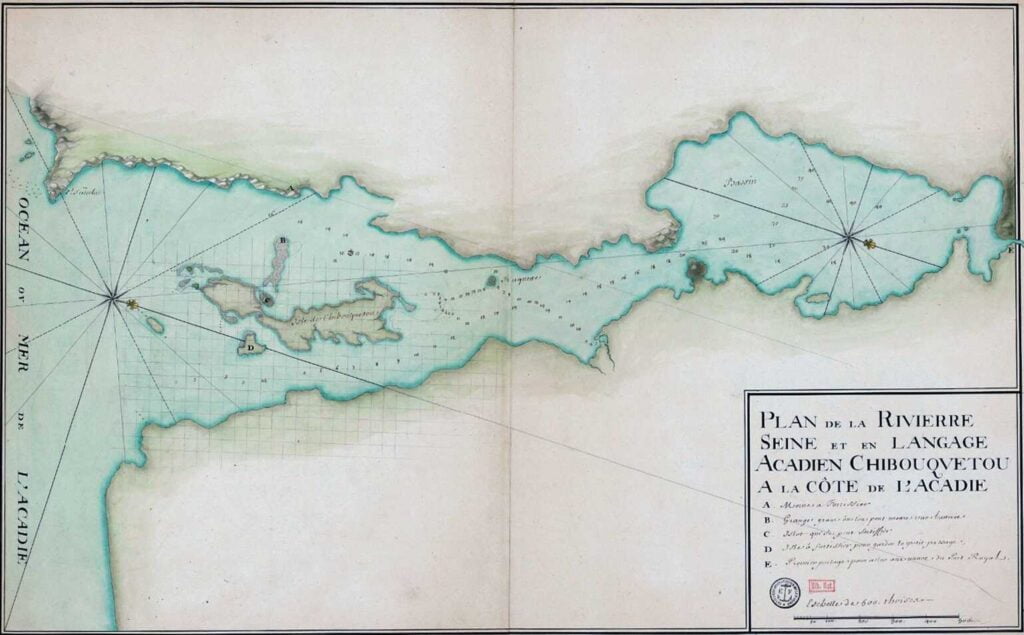
Not sure whether this is the 1711 map Martin attributes to De Labat but it is detailed, especially as it relates to the Dartmouth Cove, and it contains a number of soundings as he describes. From: “Plan de la rivière de Seine et en langage accadien Chibouquetou” http://gallica.bnf.fr/ark:/12148/btv1b53089940v/f1.item.r=halifax.zoom
